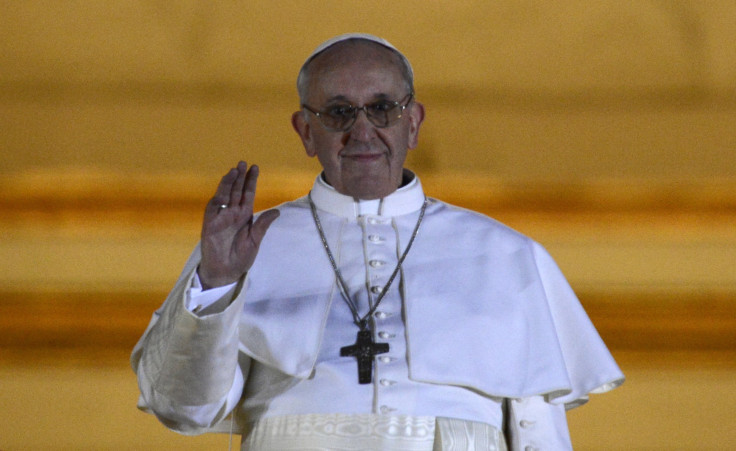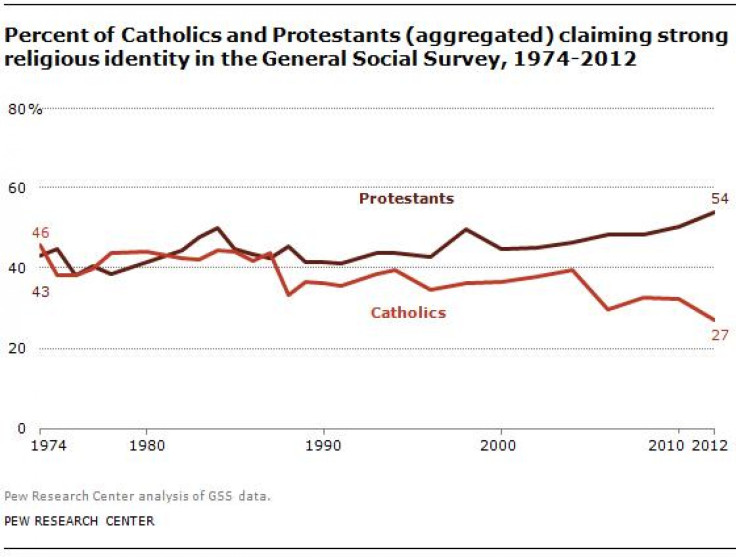Do American Catholics Care About New Pope Francis I?

Roman Catholics across the world are celebrating the ascension of the newest pope, Jorge Mario Bergoglio, who will now be known as Francis I. But statistics indicate that American Catholics may be less enthusiastic than their brethren in other countries.
The percentage of U.S. Catholics who identify themselves as “strong” members of the Roman Catholic Church has been declining steadily since the 1980s, according to data compiled by the Pew Research Center Forum on Religion and Public Life.
About a quarter (27 percent) of American Catholics said they “strongly” identified with the faith in 2012, among the lowest levels seen in the past 38 years. Even among self-professed “strong” Catholics, church attendance has been declining (the share that says they attend a weekly Mass dropped from 85 percent in 1974 to 53 percent last year). Among Catholics overall, weekly church attendance fell from 47 percent to 24 percent.

Some of that drop can be attributed to the slew of child sex abuse scandals that have been the subject of too many headlines in the English-speaking world. In a separate Pew survey of approximately 1,000 self-described Catholics, 34 percent said clerical sex abuse and pedophilia was the most important problem facing the Catholic Church today. Nearly one in 10 said the church also faces a lack of credibility or trust, while 7 percent said it is socially out of touch.
A plurality of respondents said the “most important” way the Catholic Church currently aids society is by helping the poor and performing charitable works.
The new Pope Francis, a doctrinal conservative, is already known for identifying with the poor. Some higher-profile examples of that include his habit for using public transportation and, when he was appointed a cardinal, persuading hundreds of Argentines to not fly to Rome. Instead, he encouraged them to donate the money they would have spent on plane tickets to the poor.
Network, a Catholic social justice lobby based in the U.S., issued a statement calling for such a church leader after news of Pope Benedict XVI's resignation broke.
“At this time of transition, we are praying for the pope and for the church as a whole. We pray especially that our leaders will effectively address current divisions within the church. We believe that this can be accomplished most effectively through pastoral, compassionate leadership,” the group said in a statement.
Just last summer, the Vatican released a sharp critique of American nuns -- such as the nuns who participate in Network -- for challenging church teachings on homosexuality and the male-only priesthood, in addition to making other public statements that "disagree or challenge the bishops." The Vatican also said American sisters were devoting too much time to poverty reduction and economic injustice, while keeping "silent" on social issues such as abortion and gay marriage.
Cardinal Timothy Dolan of New York, the president of the United States Conference of Catholic Bishops, said the selection of the man now known as Francis I was “an inspired choice.”
“The election of Cardinal Jorge Mario Bergoglio, who has taken the name Francis I, marks a great milestone in our church. As successor to Peter, our first pope, Pope Francis I stands as the figure of unity for all Catholics wherever they reside,” Dolan said in a statement. “The bishops of the United States thank God for the guidance of the Holy Spirit and the inspired choice of the College of Cardinals.”
© Copyright IBTimes 2024. All rights reserved.











